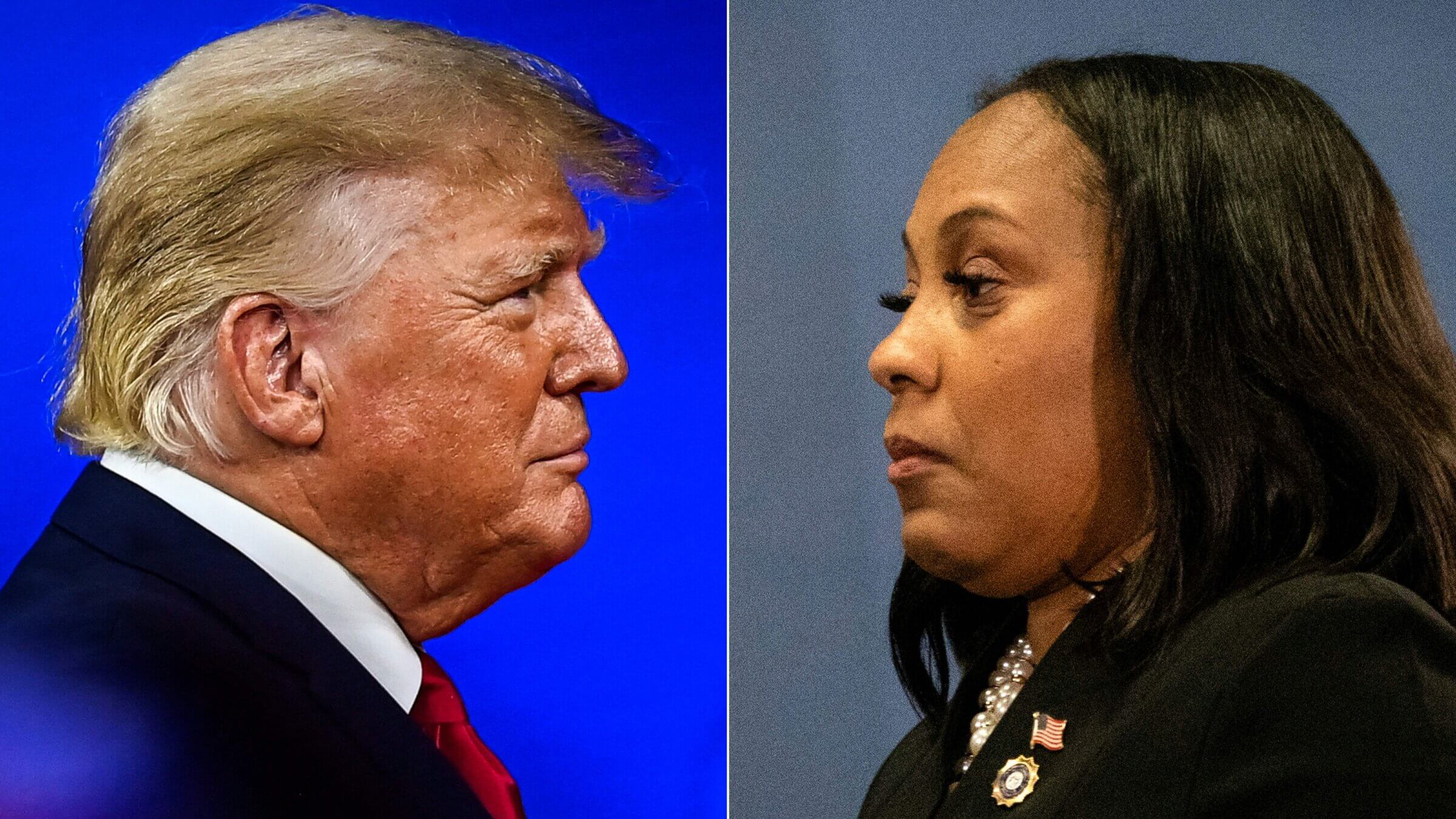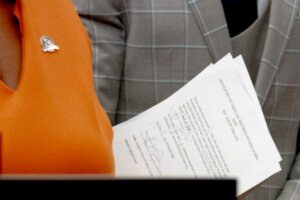With the latest staggering indictment, Donald Trump may finally face his personal Yom Kippur
As we enter Elul — the Jewish month for penitence and reflection — all eyes are on Georgia and the man who was just indicted there

Donald Trump and Fulton County District Attorney Fani Willis. Photo by Getty Images
We’re all feeling Trump Fatigue. Another indictment, another mind-numbing array of facts. Yes, this is historic stuff — but it also is a lot of stuff.
So, let’s zoom back. Back from the 91 felony counts, the 161 conspiratorial acts listed in the Georgia indictment, the boxes of files in the bathroom. What is all really this about?
Yom Kippur. This is Donald Trump’s Yom Kippur.
I say this not only because Elul — the Jewish month of penitence and reflection — begins this week, but because, if we step back from the details, these profound cases are about accountability for one’s misdeeds. They are about the fundamental question of whether, even for powerful men, criminal actions have consequences.
We now know, on the basis of evidence cited in these indictments, that Trump and his advisers knew that he lost the 2020 election. And yet, they took a variety of actions to throw out legal ballots, allege fraud where none existed, pressure Vice President Mike Pence to throw out the certified election results, and, in a thousand other ways, nullify the lawful results of the election.
This threshold issue is important for two reasons.
First, of course, it’s necessary to establish the criminal cases. If Trump and his team legitimately thought they won, then it’s harder (though still not impossible) to prove the mens rea, the criminal intent, to nullify the election and violate the law in dozens of ways.
More importantly, though, it’s tragically still the case that over half of registered Republicans say that the 2020 election was rigged, fraudulent or stolen. This is not everybody, by any means; there are some Forward readers who may have supported Donald Trump because of concerns about Israel, but who never were on board with his shenanigans, up to and including the Big Lie.
But it’s still a lot of people. And if there’s only one thing that I wish would come out of the Georgia and the January 6 indictments, it’s the astonishing record of facts showing that Donald Trump knew he lost and has lied about it until this very day. Even today, he knows the truth, and yet he’s lying right to our faces.
And not just lying, of course, but acting on the basis of those lies. That’s the other important element of the Georgia indictment: It utterly demolishes the claim that Trump’s efforts merely constitute free speech.

For example, remember that infamous (and recorded) phone call with Georgia Secretary of State Brad Raffensperger, in which Trump asked him to “find” 11,780 votes? It’s only a small sliver of the indictment: count 28 of the 41 criminal charges. But the crime is clear: Solicitation of Violation of Oath by a Public Officer. Because it’s not “free speech” to solicit a government official to violate their oath of office and commit a felony. Like bribery or blackmail, which are also speech acts, such solicitation is a crime.
Indeed, the racketeering charge in particular, with its 191 acts of conspiracy, reads like the Jewish Al Chet prayer, with each act ending with the refrain, “This was an overt act in furtherance of the conspiracy.” Read it aloud and it sounds like a responsive reading:
False claims of voter fraud. This was an overt act in furtherance of the conspiracy.
False accusations against election workers. This was an overt act in furtherance of the conspiracy.
Appointment of false electors. This was an overt act in furtherance of the conspiracy.
Behind this literal litany of charges and allegations lies the fact that Trump has operated this way for decades.
If these charges are a political vendetta, what about the lawsuits against Trump that preceded his time in public office? Like the ones about the fake “Trump University,” which ended with Trump paying a $25 million settlement. Or the 60 lawsuits over unpaid wages, including 24 violations of the Fair Labor Standards Act. Or, going back to 1973, the Department of Justice lawsuit alleging that Trump’s rental properties discriminated against Black applicants — even marking their applications with a ‘C’ for ‘Colored’ (settled in 1975, without Trump admitting guilt).
But there is, as Republicans have lately cried, a two-tiered system of justice in this country — only it benefits rich folks like Donald Trump, who can afford lawyers (including, in the 1973 case, Roy Cohn himself) and use litigation as a tool of harassment. And so, until now, there has been precious little accountability.
And beyond the unlawful acts, the lies. Trump lied more, and more audaciously, than any other president in the historical record, making 30,573 false or misleading statements during his four years in office. The Big Lie is well-known, but the little lies are even more telling. Pretending to be his own publicist, even using a fake voice. Printing fake copies of Time magazine with himself on the cover. And yes, even the combover, which journalist Michael Wolff finally explained in his 2018 book.
All these lies, great and small, over so many decades; so many misdeeds, without significant consequences. But now it is Yom Kippur.
Trump’s hair and makeup may have been harmless, but his acts to overturn the 2020 election may have been criminal. (Of course, like anyone else, Trump is innocent until proven guilty.) And now the Book of Judgment is open, with Trump’s alleged misdeeds written out in excruciating detail. The lies about the “ballots under the table,” about Dominion voting machines, about 5,000 dead Georgians voting, about election worker Ruby Freeman (whose life was nearly ruined as a result), that 250,000 ballots were mysteriously dropped into the Georgia voting rolls, that 904 people registered with a post office box as their address — on and on and on goes the litany of lies, and the actions taken on the basis of them. All is laid bare.
This is the essence of Yom Kippur: kapparah, a word with the literal meaning of scouring, cleansing and revealing. Whether we believe in a Cosmic Judge or not, this process is very real, if we choose to engage in it. It is a time of holding ourselves to account.
But of course, this is only half of the Yom Kippur story. The other half is what Donald Trump has never been able to achieve: teshuvah, the possibility of catharsis, repentance and return. If we seek forgiveness from others, we can rebuild the bridges of broken relationships. If we own up to our misdeeds, our words and acts of unkindness, there is the possibility of rebirth and renewal.
It’s hard to imagine Donald Trump doing any of that, of course. But the first half of Yom Kippur is no longer up to him. He stands accused of serious crimes, actions that are not reducible to mere political machinations or expressive speech. And whatever we may think of the Divine Judge, Judges Tanya Chutkan and Robert McBurney are very real, and so are the crimes Trump is accused of committing.
The bill may finally come due. The guilty are called to account. Donald Trump’s Yom Kippur approaches.

















